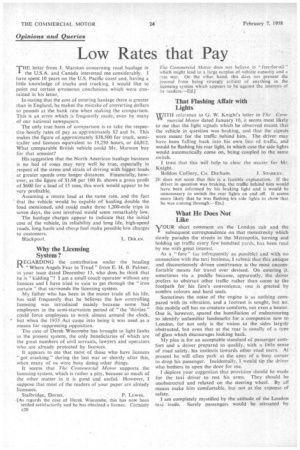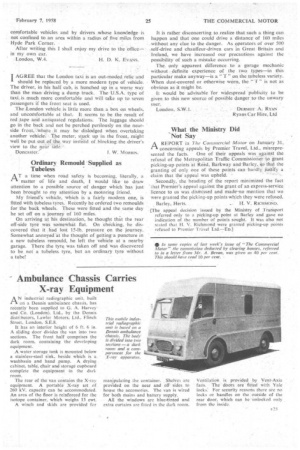Low Rates• that Pay
Page 68

Page 73

If you've noticed an error in this article please click here to report it so we can fix it.
THE letter from I. Marston concerning road haulage in the U.S.A. and Canada interested the considerably. 1 have spent 10 years on the U.S. Pacific coast and, having a little knowledge of trucks and trucking, I would like to point out certain erroneous conclusions which were contained in his letter.
In stating that the cost of entering haulage there is greater than in England, he makes the mistake of converting dollars to pounds at the bank rate when making the comparison. This is an error which is frequently made, even by many of our national newspapers.
The only true basis of comparison is to take the respective hourly rates of pay as approxiMately $2 and 5s. This makes the figure of ,approximately $38,500 for truck, semitrailer and licences equivalent to 19,250 hours, or £4,812. What comparable British vehicle could Mr. Marston buy for that amount?
His suggestion that the North American haulage business is no bed of roses may very well be true, especially in respect of the stress and strain of driving with bigger loads at greater speeds over longer distances. Financially, however, as the figure of $1:98 per 100 lb. shows a gross profit of $600 for a load of 15 tons, this work would appear to be very profitable.
Assuming a return load at the same rate, and the fact that the vehicle would be capable of hauling double the load mentioned, and could make three 1,200-mile trips in seven days, the cost involved would seem remarkably low.
The haulage charges appear to indicate that the initial cost of the vehicle, its reliability and long life, high-speed roads, long hauls and cheap fuel make possible low charges to customers.
Blackpool. Ie, DOLAN.
Why the Licensing System ?
REGARDING the contribution under the heading ." Where Angels Fear to Tread" from E. H. B. Palmer, in your issue dated December 13, who does he think that he is " kidding ".? I am a small coach operator without any licences and I have tried in vain to get through the "iron curtain" that surrounds the licensing system.
My father who has been in the motor trade all his life, has said frequently that he believes the law controlling licensing was introduced mainly because some bad employers in the semi-starvation period of "the 'thirties" could force employees to work almost around the clock, but when the 1933 Act came into being it was used as a means for suppressing opposition.
The case of Derek Wiscombe has brought to light faults in the present system, the only beneficiaries of which are the great numbers of civil servants, lawyers and operators who are already protected by licences.
It appears to me that most of those who have licences got cracking" during the last war or shortly after this. when many of us were busy doing other things.
It seems that The Commercial Motor supports the licensing system, which is rather a pity, because so much of the other matter in it is good and useful. However, I suppose that most of the readers of your paper are already licensees.
Stalbridge, Dorset. P. LEWIS, [As regards the case of Derek Wiscombe, this has now been settled satisfactorily and he has obtained a licence. Certainly The Commercial Motor does not believe ri" free-for-all which might lead to a large surplus of vehicle capacity and a rate war. On the other hand, this does not prevent the journal from being strongly critical of anything in the licensing system which appears to be against -the interests of its readers.---Ed.}
That Flashing Affair with Lights .
wiTH reference to G. W. Knight's letter in The Commercial Motor dated January 10, it seems most likely to me that thelight signals which he observed meant that the vehicle in question was -braking, rind that the signals were meant for the traffic behind him. The driver may have been falling back into his own line of traffic, and would be flashing his rear light, in which case the side lights would automatically come on, being_ coupled to the same switch.
1 trust that this will help to clear the neuter for Mr. Knight.
Boldon Colliery, Co. Durham. 1. Su iRKEY
[It does not seem that this is a feasible explanation; if the driver in question was braking, the traffic behind him wonld • have been informed by his braking light and it would be unnecessary to switch -the rear lights on and off. It seems more likely that he was flashing his side lights to show that he was coming through.—EN
What He Does Not Like
YOUR short comment on the London cab and the
subsequent correspondence on that monstrosity which slowly parades the streets in the Metropolis, turning and holding up traffic every few hundred yards, has been read by me with great interest.
As a "fare" (as infrequently as possible) and with no connection with the taxi business, I submit that this antique and discourteously driven contrivance is the most uncomfortable means for travel ever devised. On entering it, sometimes via a puddle because, apparently, the driver prefers to obstruct other traffic rather than come to the footpath for his fare's convenience, one is greeted by sombre colours and hard seats.
Sometimes the noise of the engine is as nothing cornpared with its vibration, and a footrest is sought, but no, this mobile cell has no creature comforts, not even a heater. One is, however, spared the humiliation of endeavouring to identify unfamiliar landmarks for a companion new to London, for not only is the vision to the sides largely obstructed. but even that at the rear is usually of a type of glass which discourages looking back.
My plea is for an acceptable standard of passenger comfort and a driver prepared to qualify, with a tittle sense of road safety, his instincts towards other road users. At present he will often park at the apex of a busy corner to drop his passenger. Incidentally, I would tip the driver who bothers to open the door for me.
I deplore your suggestion that provision should be made for the taxi driver to rest his arms. They should be unobstructed and relaxed on the steering wheel. By all means make him comfortable, but not at the expense of safety.
I am completely mystified by the attitude of the London -taxi trade. Surely passengers would be attracted by
con fortable vehicles and by drivers whose knowledge is not confined to an area within a radius of five-miles frcim Hyde Park Corner.
After writing this I shall enjoy my drive to the office-' in my own car.
' London, W.4. H. D. K. EvANs.
AGREE that the London taxi is an out-moded relic and -t should be replaced by a more modern type of vehicle. The driver, in his hail: cab, is hunched up in a worse way than the man driving a dump truck, The U.S.A. type of taxi.,is much nuke comfortable and will take up to seven passengers if the front seat is used.
The London vehicle is little more than a box on vheels, and uneornfortable at that It seems to be the result of red Jape and antiquated regulations. The luggage should go in the back and not be perched perilously on the nearside front, .where it may be dislodged when, overtaking another vehicle. The meter, stuck up in the front, might well be put out of the way instead of blocking the driver's view to the near side.
Doncas ter."' T. W. MortRis.
Ordinary Remould 'Supplied as Tubeless
T a time when road safety is becoming, literally. a " matter of lire and death, I would like to draw attention to a possible source of danger which has just been brought to my attention by a motoring friend.
My friend's vehicle, which is a fairly modern one, is fitted with tubeless tyres. Recently he ordered two remoulds for the back wheels. These were fitted and the same day he set off on a journey of 160 miles.
On arriving at his destination, he thought that the rear off-side tyre was somewhat fiat. On checking, he discovered that it . had loSt 15-1b. pressure on the journey. Somewhat annoyed-at the thought of getting-a puncture in a new tubeless remould, he left the vehicle at a nearby garage. There the tyre was taken off and -was discovered to be not a tubeless tyre, but an ordinary tyre without a tube!
It is rather disconcerting to realize that such a thing can happen and that one could drive a distance of 160 miles without any clue to the danger. As operators of over 509 .self-drive and chauffeur-driven cars in Great Britain and Ireland, we have increased our precautions against the possibility of such a mistake occurring.
The, only apparent difference. to •a garage mechanic without ; definite experience of the two types—in this particular make anyway—is a " T " on the Wheless variety. When dust-covered or otherwise worn, the ." T" is not as obvious as it might be.
It would be advisable for widespread publicity to be given to this new SOU-NC of possible danger to-the unwary user.
London, DERMOT A. RYAN
R yans Car Hire, Ltd
What the Ministry Did "Not Say
A REPORT in The Commercial Motor on January 31, " concerning appeals by Premier Travel, Ltd., misrepre sented the facts. One of their appeals was against the refusal of the Metropolitan Traffic Commissioner to grant picking-up points at Reed, Barkway and-Barley, so that the granting of only one of these points can hardly lustily a claim that the appeal was upheld.
Secondly, the heading of the report minimized the fact that Premier's appeal against the grant of an express-service licence to us was disMissed and made-no mention that we were granted the picking-up points which they were refused.
Barley, Herts. H. V_ itictimoND.
• [The appeal decision issued by the Ministry of Transport referred only to a picking-up point at Barley and gave no indication of the number of points sought. It was also not stated that H. V. Richmond were granted picking-up points refused to Premier Travel Ltd.—ED.]
• In some copies of lost week's issue of The Commercial Motor" the C01111771.5Si011 deducted by clearing houses, referred to in a letter from Mr. A. Bevan, was given as 40 per cent. This should hare read 10 per cent.
































































































































